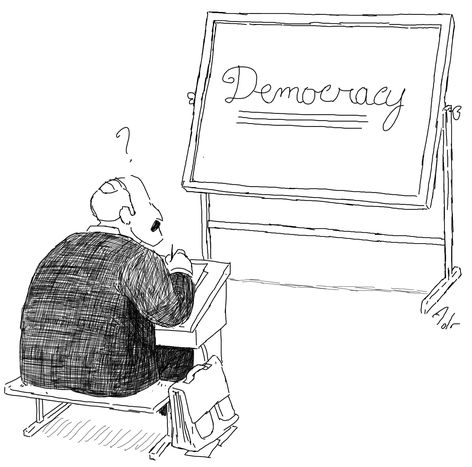
Ludicrousness from Lukaschenko Land: 1994, 2001, 2006, 2010
Published on
Translation by:
Annie RutherfordIt is a dictatorship and it is our dictatorship: in Europe, right next door to the EU. On 19th December it’s that time again: Belarusian citizens will be called upon to elect their president. In the lead up to this date one Frenchwoman in Berlin discusses the ludicrousness from Lukashenko land on cafébabel.com.
Claudine Delacroix’ fifth post considers 'modest election forecasts and idiots in the opposition'
5 - 1994, 2001, 2006, 2010 – elections and Lukashenko
For someone who can look forward to approval ratings of far above 50 percent, election campaign time should represent a series of uplifting experiences, one after the other. This however is only the case when these results truly reflect the mood of the population.
These are hard times for Alexander Lukashenko, who in the last elections was re-elected as president of the Belarusian Republic with 82.6 percent of the vote. After all, in order to preserve the democratic façade, you have to allow candidates to stand against you, who on top of everything else have to be allowed time to speak in Lukashenko’s domain of adverts, Belarusian television. Not that the relationship of the candidate’s programme time to that of the others is disproportionally imbalanced as a result. Channel one shows Lukashenko chatting with farmers in a village; on channel two he thanks factory workers for their work; that’s without even mentioning the close-ups of his meetings with the great and mighty of this world. The other candidates however are just given an hour, which the presenters can frame with adequately derisive remarks. But this is still enough to bring a few dissonances into the harmony of the happy Lukashenko world.
But happily the competition as to who can insult and sneer at opponents the most does not have to be left to TV presenters. No, Lukashenko himself regularly vents his feelings about the disruptive opposition candidates and grants them such nice descriptions as 'idiots' as well as that regular and recurrent term 'our idiots'.
Our other columns covering Lukashenko include:
1) Ludicrousness from Lukashenko land
2) Ludicrousness from Lukashenko land: Blogger Medvedev versus spammer Lukashenko
3) Ludicrousness from Lukashenko land: as the president, so the protest
4) Ludicrousness from Lukashenko land: two-faced EU politics made in Belarus
This is not enough however; they have also been connected with a conspiracy against Belarus, in which they are the so called 'fifth column'. It remains open for whom they are the fifth column, whether for the no longer quite so friendly Russia or for the west – the EU or the USA. Perhaps that isn’t even so important. More decisive is the message: there are many enemies and I, the strong man and knight in shining armour, will protect our Belarus.
But back to the efforts of the Belarusian election campaign striving for the pleasing appearance of democracy: while the concept of opposition candidates who are allowed to present themselves to their candidates even if only in a fragmentary way, is can generally allowed to be recognised, Lukashenko still has his very own definition of democratic relations in other areas. Take for example the theme of vote-rigging. As we all know, these are nasty and undemocratic. But is that true in every case? Can there not perhaps be good vote-rigging too? Let’s allow Lukashenko himself explain this paradox to us. When asked straight after the last presidential elections by Ukrainian journalists about his fantastic results, he expressed himself in the following way: that of course there was vote-rigging. That he was even forced to do so. That the result had actually been even higher, but as the EU would never believe such figures and the accusation of dishonest means would immediately hang in the air, there was no alternative but to lower the result by a few more percentage points. Amazement and commotion broke out among the journalists – how tiresome Europe can be! Even his hard won approval points had to be miscounted with the help of election rigging, in order for there then to be a chance of the election being recognized as democratic. And Belarus is described as a country of absurdities?
It has to be said here that Lukashenko in the run up to the last election in 2006 had announced as a desirable result the exact percentage of the votes which he then received. The situation in 2010 is much more complicated. While previous elections, could always count on recognition from Moscow despite all of them being written off by the EU as undemocratic, this time there’s a real danger that Russia will withhold her blessing. This makes the EU’s recognition even more important and so a similarly high result would be political suicide. Because of this the official target was made much clearer this time so as to definitely reach the overzealous polling station leaders deep in the countryside: a simple two third majority securing Lukashenko victory in the first round of voting is quite enough.
Let’s wait until election day then – will the result really be 66.6% for Lukashenko? And if that’s the case, what will the clearly unhappy population say to this election result? 19 December will tell.
Translated from Absurdes aus Lukaschenko-Land: 1994, 2001, 2006, 2010



